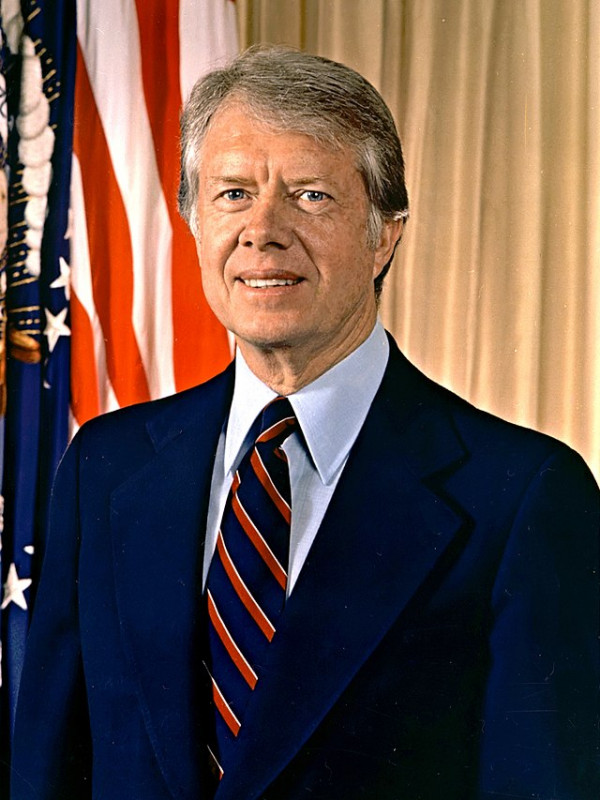Jimmy Carter, Global Humanitarian and Former U.S. President, Dies at 100

Jimmy Carter, the 39th president of the United States and a Nobel Peace Prize laureate renowned for his humanitarian work around the world, has died at the age of 100. The Carter Center announced his death on Sunday, marking the close of a remarkable life that featured both a tumultuous presidency and decades of dedicated public service. His wife Rosalynn Carter died just last month, two days into her own transition to hospice care. Despite his advanced age and declining health, the former president notably appeared at her memorial service in November, bidding farewell to his partner of 77 years.
Best known for a single term in the White House from 1977 to 1981, Carter’s presidency was characterized by escalating global tensions, an energy crisis, and the Iran hostage debacle. Many political observers cite those struggles as significant factors in his landslide defeat to Ronald Reagan in the 1980 election. Yet, in the years that followed, Carter re-emerged as a tireless champion of democracy, global health, and conflict resolution. Awarded the Nobel Peace Prize in 2002, he was recognized for “decades of untiring effort” to foster peace and protect human rights.
In February 2023, The Carter Center announced that, after a “series of short hospital stays,” Carter had opted for hospice care at home “instead of additional medical intervention.” Jason Carter, the Carters’ grandson and chair of The Carter Center, provided periodic updates on his grandfather’s condition. On May 14, 2024, he stated, “He really is, I think, coming to the end that, as I’ve said before, there’s a part of this faith journey that is so important to him. And there’s a part of that faith journey that you only can live at the very end. And I think he has been there in that space.”
The outpouring of public concern rose further when Rosalynn Carter entered hospice care last November after her own health deteriorated. She died two days later, at 96. Remarkably, Jimmy Carter still found the strength to attend her funeral, riding in a motorcade in Plains, Georgia. It was in Plains that the Carters had famously made one of their final joint public appearances at the Plains Peanut Festival in September 2023, greeting supporters from the window of a black SUV, seven months after the former president first entered hospice.
Born James Earl Carter Jr. on October 1, 1924, in Georgia, he was a proud graduate of the U.S. Naval Academy. Following seven years of service in the Navy, Carter returned to Georgia to run his family’s peanut farm, launching a career in public office that led him from the Georgia Senate to the governor’s mansion and ultimately to the White House. Overcoming initial skepticism as a relative outsider in Washington, Carter sparked early hope with his commitment to government transparency and integrity, aims that resonated in the post-Watergate era.
Carter’s foreign policy achievements included the landmark 1978 Camp David Accords, which forged a peace treaty between Egypt and Israel that remains in place to this day. Domestically, he was lauded for supporting the Department of Education’s creation and calling attention to pressing environmental concerns, famously installing solar panels on the White House. In later years, he bluntly criticized the removal of those panels, speaking out consistently for renewable energy and responsible resource management.
While his presidency ended amid the Iranian hostage crisis, economic malaise, and a bruising electoral defeat, Carter went on to redefine what an ex-presidency could look like. According to historian Julian Zelizer, “He remains such a controversial figure. But like it or not, he re-invented the post-presidency.” Working through The Carter Center, founded in 1982, he monitored elections worldwide, led efforts against diseases like Guinea worm, and promoted conflict resolution in some of the globe’s most challenging regions.
Carter was never shy about expressing strong views on political matters. He joined other living former presidents in 2021 to condemn the attack on the U.S. Capitol, calling it a “national tragedy” and “not who we are as a nation.” In 2015, he took direct aim at the Supreme Court’s Citizens United decision, saying, “It violates the essence of what made America a great country in its political system. Now it’s just an oligarchy, with unlimited political bribery being the essence of getting the nominations for president or to elect the president.” Carter also spoke out against the 2003 invasion of Iraq, the prison at Guantánamo Bay, and what he perceived as persistent challenges to Middle East peace.
A devout Baptist, Carter taught Sunday school in Plains for decades and openly shared his spiritual reflections. During one appearance at Maranatha Baptist Church, he recalled a moment following his cancer diagnosis when he prepared for the possibility of imminent death. “I assumed, naturally, that I was going to die very quickly,” he said. “I obviously prayed about it. I didn’t ask God to let me live, but I asked God to give me a proper attitude toward death. And I found that I was absolutely and completely at ease with death.”
Carter’s final resting place will be in his hometown of Plains, Georgia, where he began and ended his extraordinary journey. “I just want to keep the whole world at peace,” he once said at The Carter Center—an aspiration that guided much of his life’s work and will remain his enduring legacy.












